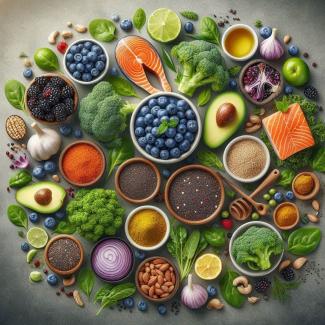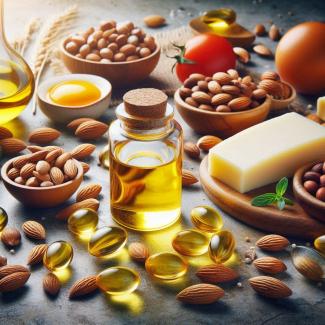- Role: Fats are a concentrated source of energy and serve various functions, including insulating and protecting organs, supporting cell growth, and helping absorb fat-soluble vitamins (A, D, E, and K).
- Types: Fats can be divided into several types: a. Saturated fats: Found in animal products and some plant oils, these fats are solid at room temperature and are associated with an increased risk of heart disease when consumed in excess. b. Unsaturated fats: These include monounsaturated and polyunsaturated fats, which are generally considered healthier. They are found in foods like olive oil, avocados, and fatty fish. c. Trans fats: These are artificial fats created through hydrogenation and are found in many processed foods. They are considered unhealthy and are linked to heart disease.
- Food sources: Fats are present in foods such as butter, oils, nuts, seeds, fatty fish, avocados, and dairy products.
Superfoods are nutritionally dense foods that are believed to be especially beneficial for health and well-being.
Cod liver oil, a nutrient-dense oil extracted from the liver of codfish, has been used for centuries as a potent natural remedy and dietary supplement.
Egg production methods can vary significantly in terms of animal welfare, environmental impact, and the quality of the eggs produced.
Linoleic acid is an essential omega-6 fatty acid, meaning that it is necessary for human health but cannot be synthesized by the body and must be obtained from the diet.
Cod liver oil is often associated with several potential health benefits, including those related to heart health, brain health, and skin health.
Eggs are nutritionally rich and versatile foods with several health benefits. Let's take a detailed look at some of the key advantages of consuming eggs:
Cod liver oil is a popular dietary supplement that is derived from the liver of cod fish. It is known for its high content of omega-3 fatty acids, as well as vitamins A and D.
Omega-3 fatty acids are essential nutrients that offer a wide range of benefits for the human body. Here's a detailed description of why omega-3 is good for human health:
Eggs have been a subject of debate when it comes to their impact on heart health due to their cholesterol content.









